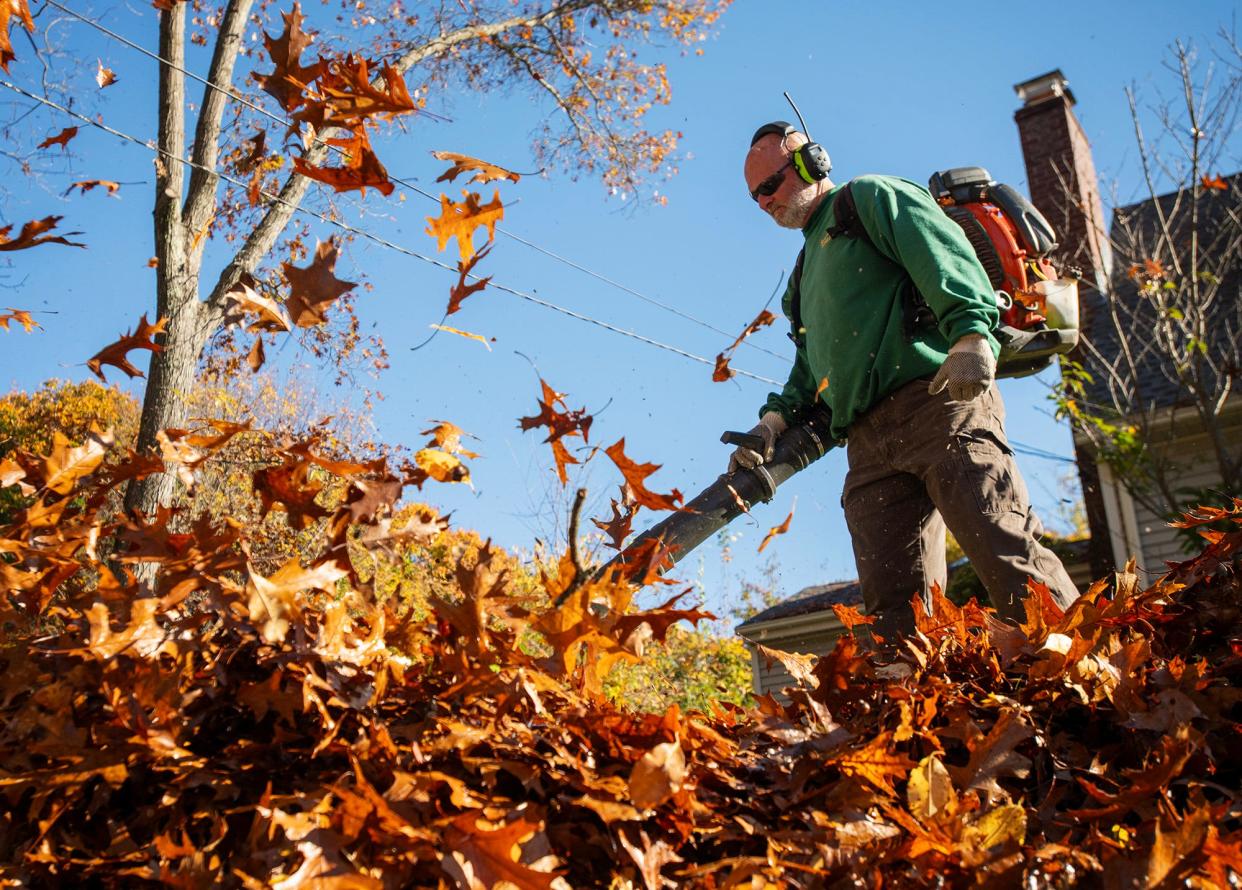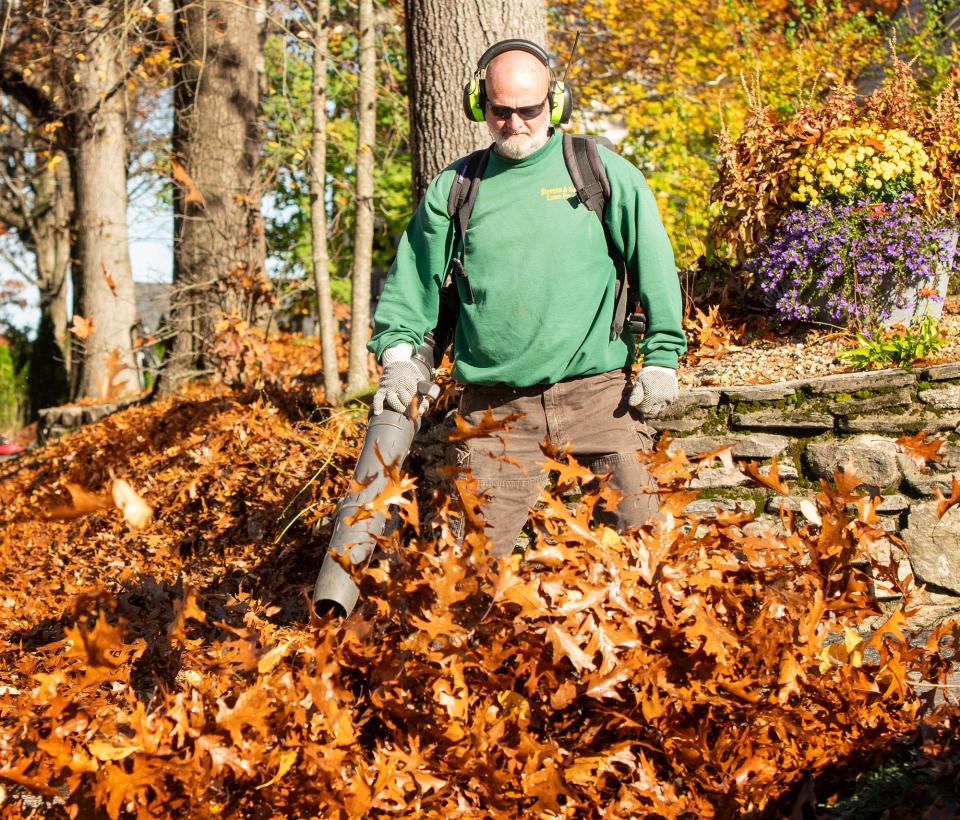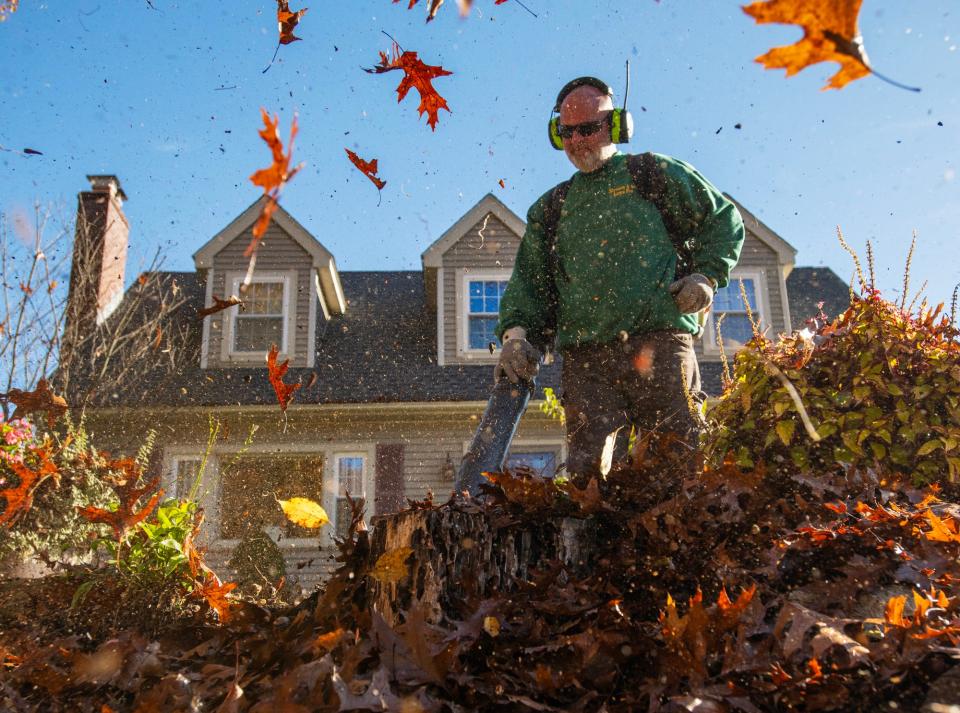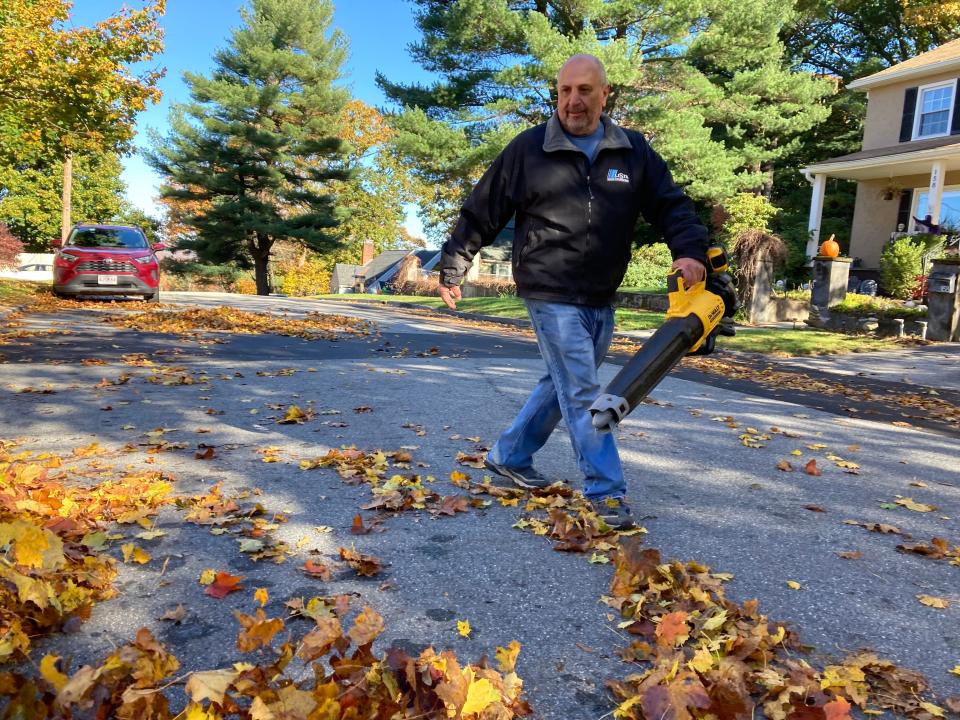Is it time to phase out gas-powered lawn mowers and leaf blowers? Not so fast, some say

WORCESTER – Most of us like looking at the fall foliage, but it comes with something that we dread — falling leaves, especially if we own a property or home that is blanketed by them. We either gather up the leaves ourselves or call in a landscaper to do the job.
That’s where Mark Stevens Jr. comes in. The Auburn-based landscaper recently strapped his gas-powered leaf blower to his back and blew a deep carpet of leaves from a client’s yard on Wyola Drive into a neat row that he carted away.
That gas-powered blower does the job, but it’s harmful for the environment, according to a new study by Environment America, U.S. PIRG Education Fund and the Frontier Group.
It recommends migration to electric-powered lawn and garden equipment because the planet is showing severe signs of climate distress. One way to mitigate the problem, the study said, is to use electric equipment that is quieter, cleaner, has improved technology that meets the performance of many gas models and will save owners money in the long run because of efficiency and less maintenance costs compared to gas products.
The study includes data that highlights gas equipment’s harmful impacts on the environment in 2020 based on information from the U.S. Department of Environmental Protection.
● More than 21,000 tons of fine particulates were emitted, linked to a range of health problems including cancer. The total is equivalent to the pollution from more than 200 million cars.

● More than 68,000 tons of nitrogen oxides that create smog and breathing problems were emitted, an amount equivalent to pollution from 30 million cars.
● More than 30 million tons of carbon dioxide, a major contributor to climate change, were emitted. That is equivalent to the amount of carbon emitted from more than 6 million cars.
“That's actually amazing. I never would have thought the numbers were that high,” said Stevens on that last point.
In Massachusetts, the study showed more than 600,000 tons of carbon emitted in 2020, equal to the amount from more than 135,000 cars. In Worcester County, more than 60,000 tons of carbon was released, equal to emissions from more than 13,000 cars.
Electric options: Performance isn't there, yet
When making the choice between gas-powered and electric, Stevens said the former has the power, reliability and affordability he needs to get the job done for his customers. Bottom line, electric doesn't cut the mustard for Stevens.
He recently bought a $12,000 commercial-grade lawn mower for his business that he said would have cost double if he chose electric. He believes his customers won’t tolerate higher bills to pay for the more expensive equipment.
How to charge the batteries is another challenge. Stevens said many landscapers don’t have the necessary equipment on the job to do the charging and he's not alone with his reservations.

David Vetelino, who owns a landscape business in Pembroke and serves as an officer at the Massachusetts Nursery and Landscape Association. questions the power and reliability of electric equipment. As Vetelino sees it, electric batteries lack power and run out of juice too quickly: "The technology is not where it needs to be."
Worcester City Hall: No plan to phase out gas-powered equipment
Worcester City Hall declined a request to speak with Jay Fink, the city’s commissioner of Public Works and Parks, about how much of the city's equipment is gas- and electric-powered, what are the factors in deciding the mix and what are the plans to potentially fully electrify equipment supplies.
Worcester’s Department of Public Works uses gas-powered equipment almost exclusively when it comes to landscaping, said a city spokesman, adding, “There is no program, currently, to phase out the use of gas powered equipment."
Commercial side: 'More complicated'
Tony Dutzik, associate director and senior policy analyst at the Frontier Group, is one of the study’s authors. He believes improvements in battery technology make electric models a good choice for homeowners and consumers. But when it comes to landscapers that use leaf blowers, lawn mowers, weed whackers, chain saws and snowblowers for a living, there’s still a way to go to get them to adopt electric.
“Commercial is more complicated,” said Dutzik. “Transition is going to be a longer one.”

Ricky Boyer would agree with that assessment. Boyer used an electric leaf blower on Brookline Street in Worcester for a small part of the yard. Boyer has a gas blower that he uses for the main part of the property because it has the power to do the job.
"I don’t know if they’re ever going to want to,” said Boyer when asked what it’s going to take to get homeowners and landscapers to migrate away from gas and toward electric. “The problem is the power, the power between electric and gas.”
Study recommendations: Government regulations
One of the study’s recommendations to push the transition along is for local and state governments to consider regulations to phase out gasoline-powered lawn equipment.
There is precedent here. Starting Jan. 1 in California, there is a statewide ban on the sale of new small, off-road engines — a category that includes leaf blowers, lawn mowers and other equipment — to meet zero emission targets. The ban doesn’t impact buying older gas models still on the sales floor or using ones that residents already own.
Closer to home, Brookline banned the use of gas-powered leaf blowers during periods when leaf collection is not at its peak. The move was made to cut emissions and noise, and the banned periods include Jan. 1 to March 14 and May 16 to Sept. 30.
State Sen. Becca Rausch, D-Needham, chairs the joint Committee on Environment and Natural Resources and said the Legislature has done a lot of good work over the past several years to address climate change through investor-owned utilities and energy regulations.
Outside of that, Rausch noted there’s still work to do: “The time is now for us to do some deep legislative work on many other aspects of climate change.”
Rausch appeared surprised when told of the study’s data that showed more than 600,000 tons of carbon emissions in Massachusetts in 2020 from gas-powered lawn equipment that equaled emissions from more than 130,000 cars in one year.
“One hundred and thirty thousand cars. That’s an awful lot of pollution. It definitely makes me raise an eyebrow,” said Rausch.
When asked if Massachusetts' lawmakers would follow California’s lead and adopt a similar ban on new equipment, Rausch said there are many legal issues to consider. “I can’t comment without taking a good look."
Financial incentives: Another tool to leave gas-powered behind
Offering financial incentives to property owners and businesses is another strategy to migrate to electric, according to the study. On this front, Rausch said she needs to learn what is currently offered, taking into account existing state and federal laws.
Mass Save currently offers rebates to residential electric customers where the program is offered by Cape Light Compact, Eversource, National Grid or Unitil. The rebates for residential battery-powered lawn equipment run from $30 to $75. Incentives on the commercial side stretch from $100 to $3,500.
Rebates for both categories started in 2022 and they will continue next year, said a spokesperson at the Massachusetts Executive Office of Energy and Environmental Affairs.
“The Healey-Driscoll administration is committed to moving away from dirty fossil fuels to clean and affordable resources, including electric lawn and gardening equipment," reads the agency's statement. "Massachusetts agencies are leading by example, transitioning to all-electric equipment, and using sustainable landscaping practices to maintain state parks, forests and other public lands.”
Wachusett Mountain State Reservation in Princeton uses electric chain saws on fallen and dead trees as part of trail maintenance. The state Department of Conservation and Recreation bought two electric ride-on mowers that run for five hours and cut roughly 14 acres before needing a charge.
National Grid shared information to highlight Mass Save participation from 2022 to September 2023 including estimated cuts in gasoline consumption and greenhouse gas emissions.
● Total quantity of electric lawnmowers, leaf blowers, trimmers, chain saws: 16,890
● Gasoline saved: 257,245 gallons
● Carbon dioxide reduction: 1,642 tons translates to taking 514 cars off the roads
Getting the word out about the financial incentives appears to need more work because Stevens and Vetelino said they're not aware of them.
Worcester store owner: Sees both sides
Brian Barrows, the third generation in his family to own Barrows Hardware in Worcester, offered a perspective on gas-powered versus electric. His store sells both products, mostly to residential customers who live in the city and need equipment for smaller jobs.
Barrows agrees with what some commercial landscapers say are the dependability challenges and higher prices of electric options for their particular needs.
But Barrows believes there are plenty of viable options for residential customers to go with electric for their lawn and garden projects. Barrows bought himself a battery-powered leaf blower and loves how it performs.
"The power is unbelievable. It has a lot of firepower. I'm surprised by it."
Contact Henry Schwan at henry.schwan@telegram.com. Follow him on X: @henrytelegram.
This article originally appeared on Telegram & Gazette: Study recommends phasing out gas-powered lawn equipment; experts react

